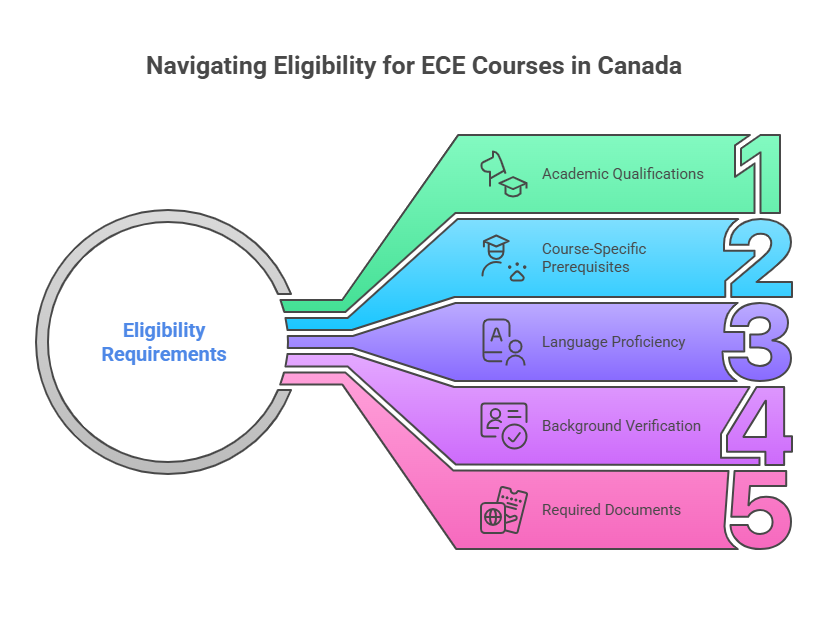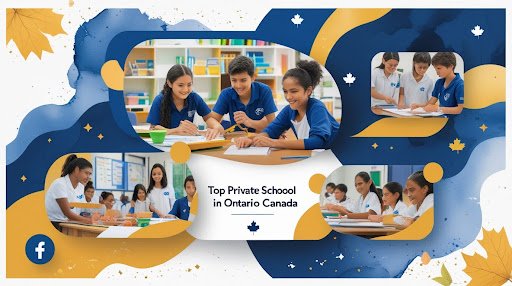Aspiring early childhood educators need globally recognized training – Canada’s ECE programs offer exactly that, with 80% of graduates securing jobs within 6 months (StatsCan, 2024). Canada boasts a high-quality education system, which is recognised worldwide, a multicultural society and an education system that places more emphasis on practical and hands-on learning. Early childhood education courses in Canada for international students offer a perfect blend of academic theory and practical training, preparing students for rewarding careers in childcare and education worldwide. For students seeking early childhood education courses in Canada, these programs blend academic theory with practical training to prepare graduates for rewarding careers in childcare and early learning.
Early Childhood Education (ECE) is one of the most in-demand study areas among students today, and this demand reflects the field’s critical role in shaping young minds. Does one need a diploma, undergraduate degree or even a master’s in the discipline? Canada has a wide variety of programs that suit the needs of students.
This is your ultimate guide on everything you need to know about early childhood education courses in Canada with respect to students, the types of programs, eligibility, cost, scholarship opportunities and career prospects upon graduation.
An Overview of Early Childhood Education Courses in Canada For International Students
In Canada, there is a range of Early Childhood Education (ECE) courses that accommodate international students, with visions to become teachers and assistants of preschoolers. These courses mix theory with practical classroom skills and graduates are set to work in children day care centers, pre-schools, kindergarten classes or even in management positions with regard to education. The students will have an option with diploma courses (typically two years), an undergraduate degree (three to four years), postgraduate certificate or diploma (typically one year), and master courses that deal with child development, curriculum design, and leadership in early learning.
There are also numerous institutions that provide short term certifications in the specialization field such as Infant and Toddler Care, Autism Support or Childcare Administration. They tend to be PGWP eligible, so that a student can seek post-graduation employment in Canada and sign a Post-Graduation Work Permit to get Canadian work experience. The content of the course normally focuses on child psychology and playing as the means of learning, curriculum planning, inclusive education, health and safety, and efficient communication with families. International graduates also have to be licensed or certified by local authorities in most provinces to work as an early childhood educator.
| Course Type | Duration | Description | Common Job Role |
| Diploma in ECE | 2 years | Focuses on child development, behavior, and curriculum planning. | Early Childhood Educator, Preschool Teacher, Daycare Assistant |
| Bachelor’s in ECE | 4 years | Offers an in-depth study including teaching strategies and policy development. | Kindergarten Teacher, Education Assistant, Program Supervisor |
| Master’s in ECE | 1–2 years | Advanced-level education, often research-based or focused on leadership. | Early Learning Specialist, Curriculum Developer, ECE Program Director |
| Online Courses/Certificates | Varies | Flexible, short-term, skill-based programs for working professionals. | Childcare Worker, Support Educator, Special Needs Assistant |
The Public colleges, private institutions, and universities offer these programs, private institutions, as well as in universities in provinces such as Ontario, British Columbia and Alberta.
Why Study Early Childhood Education in Canada?
There are a number of strong reasons why Canada is a preferred choice for ECE studies:
- International Portability: Canadian qualifications are appreciated internationally, and this creates opportunities abroad.
- Practical Experience: The majority of ECE programs will incorporate field placements or internship experiences in a childcare centre or school.
- Multicultural Learning Experience: Students study in an environment containing students from various countries, leading to better cultural awareness.
- Work Opportunities: The Post-Graduation Work Permit (PGWP) allows students to obtain Canadian work experience once they have finished their program.
- Permanent Residency: The graduates of ECE are usually eligible to immigration programs, such as Express Entry or Provincial Nominee Programs (PNPs).
Role of Early Childhood Educators in Canada
International schools in Ontario offer globally recognized curricula such as IB, British, or American programs, making them ideal for expatriate families and students seeking a high-quality education in Canada. Early childhood educators (ECEs) have the role of facilitating the emotional, cognitive, and social growth and development of children aged between 0 and 6. Their day-to-day tasks can involve:
- Creating age-appropriate learning activities.
- How to assist the child with special needs
- Health and safety standard maintenance
- Working together with families and community organisations
According to 2024 Job Bank Canada data, ECE roles show ‘strong’ demand in Ontario and BC Being one of the high-demand careers, ECEs form the basis of the education system in Canada and are core to the existence of both publicly funded and privately owned early learning centres.
Eligibility Requirements for Early Childhood Education Courses in Canada

Flexible and accessible, online early childhood education courses in Canada for international students allow learners to gain key qualifications from anywhere in the world. As an international student pursuing ECE programs in Canada, you should fulfil various eligibility requirements. Study in Canada for Indian students offers a pathway to world-class education, multicultural experiences, and excellent post-study work opportunities.
These are slightly different by institution, but typically are the following:
Academic Qualifications
- For diplomas: Class 12 or equivalent with emphasis in English.
- Bachelor: Higher secondary education with a minimum GPA or percentage as specified.
- For masters: A bachelor’s degree in education, psychology or a similar field.
Course-Specific Prerequisites
- Other programs would prefer that you have some experience working with children or have taken some coursework in child psychology.
- Immunisation reports and health screening that is mandatory.
Language Proficiency
- IELTS: 6.5 (with no band below 6.0)
- TOEFL: 88 iBT minimum
- In certain institutions, Duolingo and PTE scores can also be accepted.
Background Verification
- The nature of working with children frequently demands a police clearance certificate.
Required Documents
- Academic transcripts
- Statement of Purpose (SOP)
- Recommendation letters
- Copy of passport and valid study permit
Preparing for Your Early Childhood Education Studies in Canada
An early childhood education diploma in Canada for international students is a popular 2-year program that combines classroom learning with hands-on placements in childcare settings.
Students ought to:
- Apply for a Canadian student visa (Study Permit)
- Complete housing and healthcare insurance
- Examine curriculum documents and course plans.
- Learn provincial licensing regulations of ECE in case of working after graduation
Early Childhood Education Course Fees and Duration in Canada
Early childhood education course fees in Canada for international students typically range from CAD $12,000 to $25,000 per year, depending on the program and institution. A university prep program equips students with the academic skills, English proficiency, and foundational knowledge needed to succeed in Canadian post-secondary institutions.
The cost of early childhood education Courses varies by type and institution.
| Course Type | Duration | Average Tuition (Annual) | PGWP Eligible? | Institution Type |
| Diploma | 2 years | CAD $12,000 – $18,000 | Yes, if completed at a public college or a private college that follows public curriculum and has provincial approval | Public Colleges |
| Bachelor’s Degree | 4 years | CAD $15,000 – $25,000 | Yes, if studied at a Designated Learning Institution (DLI) that is public or eligible private university | Universities |
| Master’s Degree | 1–2 years | CAD $18,000 – $30,000 | Yes, if the institution is a public university or eligible private DLI | Graduate Schools |
| Online Courses | Varies | CAD $2,000 – $10,000 | No, online-only programs do not qualify for PGWP unless at least 50% of the course was completed in-person in Canada at a DLI | Online Institutions |
Scholarships for Early Childhood Education Students in Canada
The early childhood education requirements in Canada for international students include a high school diploma, proof of English proficiency, background checks, and immunisation records. The international students can avail the following scholarships to lighten the financial load:
- Commonwealth Canadian Scholarship Program
- Vanier Canada Graduate Scholarships
- York University International Student Scholarship
- Centennial College International Scholarships
Also, numerous institutions in Canada have affordable early childhood education programs that come with financial aid packages and entrance scholarships.
Jobs After Studying Early Childhood Education Courses in Canada
When considering tuition, early childhood education courses in Canada for international students’ fees vary by college, province, and program type, with scholarships available for eligible students. There is an increasing need for qualified early childhood educators in Canada, a most particularly in Ontario, Alberta, and British Columbia provinces. Some of the typical roles are:
| Job Title | Average Salary (CAD/year) |
| Early Childhood Educator (ECE) | 35,000 – 55,000 |
| Childcare Center Supervisor | 45,000 – 60,000 |
| Educational Assistant | 30,000 – 50,000 |
| Curriculum Planner | 50,000 – 70,000 |
Through the PGWP, students are allowed to remain in Canada after graduation to acquire some work experience that could be used to sponsor their Permanent Residency in the future.
Conclusion
Undertaking the early childhood education courses in Canada provides international learners with internationally recognised qualifications, workable skills, and prospective employment opportunities. Canada is an excellent choice to become an educator due to numerous diplomas, undergraduate and master’s programs, financial assistance and explicit immigration opportunities. Be it your desire to contribute to the life of children or to gain a stable and fulfilling profession, the ECE pathway in Canada will provide you with a sound starting point. Ready to launch your ECE career? Compare accredited programs or consult an immigration expert.
Frequently Asked Questions About Early Childhood Education Course in Canada For International Students
1. How much do health care courses cost in Canada?
2. Do international students in Canada get healthcare?
Yes, many provinces offer public healthcare for international students, while others require private insurance coverage.
3. Is early childhood education in demand in Canada?
Yes, ECE professionals are in demand due to the increasing focus on early learning and child development programs across the country.
4. Can we get PR in early childhood education in Canada?
Yes, ECE graduates often qualify for permanent residency through the Canadian Experience Class (CEC) or Provincial Nominee Programs (PNPs).
5. How many years to study early childhood education in Canada?
Diploma programs typically take 2 years, bachelor’s degrees 4 years, and master’s programs 1–2 years.






